#Narrative twists
Explore tagged Tumblr posts
Text
Fantasy Writing Lessons from It's Always Sunny in Philadelphia
In the labyrinthine world of fantasy writing, inspiration can bubble up from the most unexpected fountains. Among these, “It’s Always Sunny in Philadelphia” might seem an unlikely muse, with its band of morally dubious characters and their often preposterous escapades. Yet, beneath its chaotic surface, this series offers a trove of insights for the fantasy writer willing to look beyond the…

View On WordPress
#character development#Character Flaws#Creative writing#dark comedy#Fantasy Authors#fantasy genre#fantasy writing#group dynamics#It&039;s Always Sunny in Philadelphia#moral ambiguity#Narrative Structure#narrative twists#plot development#satire in fantasy#social commentary#storytelling techniques#Subverting Tropes.#unconventional inspiration#unpredictable plots
0 notes
Text
Steps to Write Compelling Plot Twists

follow for more tips 💋 || request writing tips 💌
1. Plan the Twist Early
Decide the Purpose: Determine how the twist advances the story or challenges the characters.
Foreshadow Strategically: Seed subtle clues throughout the narrative that hint at the twist without giving it away.
2. Build Tension and Expectations
Create a Red Herring: Introduce elements that mislead the audience into expecting a different outcome.
Heighten Stakes: Ensure the events leading up to the twist are emotionally engaging and meaningful.
3. Deliver the Twist Impactfully
Time it Right: Place the twist at a moment of high tension or when it feels least expected but still logical.
Use Reversal or Revelation: Employ one of two main twist types:
Reversal: A situation is the opposite of what the audience believed.
Revelation: New information changes the context of prior events.
4. Maintain Credibility
Anchor in Logic: Ensure the twist is believable within the story’s world and doesn’t feel contrived.
Align with Characters: Make sure the twist fits with established character motivations and actions.
5. Reflect the Impact
Affect the Narrative: Show how the twist changes the story’s direction or character dynamics.
Re-examine Earlier Clues: Allow the audience to realize how the twist was set up through earlier hints.
Examples of Plot Twists in Films and Books
1. Film Examples
The Sixth Sense: The revelation that Dr. Malcolm Crowe is dead reframes the entire story and previous interactions.
Fight Club: The twist that Tyler Durden and the narrator are the same person shocks the audience and redefines the plot.
Parasite: The discovery of the secret bunker adds unexpected layers of tension and tragedy.
2. Book Examples
Gone Girl by Gillian Flynn: Amy's manipulation and fake disappearance drastically shift the narrative’s direction.
And Then There Were None by Agatha Christie: The reveal of the murderer’s identity ties all the deaths to a chilling plan.
Harry Potter and the Prisoner of Azkaban by J.K. Rowling: The twist that Sirius Black is not the villain but Harry’s ally surprises and deepens the story.

Follow || Like || Comment || Repost || My Novel


thank you, i am farkle :)
#౨ৎ a.a.walker's tips ౨ৎ#writer#writers on tumblr#creative writing#academia#artists on tumblr#booklr#aspiring author#college#nostalgia#on writing#writing tips and tricks#writing help#writing advice#writing resources#writing stuff#fiction writing#writing tips#storytelling#write#writeblr#writers and poets#writerscommunity#writers#narrative#writing#plot twists#how to write#writers block
1K notes
·
View notes
Text
🔪 3 Plot Twists That Slap (and 1 that should be arrested) 🔪

hello and welcome back to me yelling on main about storytelling crimes. today we are talking about plot twists. specifically: the good, the god-tier, and the why-would-you-do-this-i-trusted-you tier.
let’s go.
✨ The Twist That Reframes Everything ✨ a.k.a. the “wait. WAIT.” twist. This is when you drop a twist that doesn’t just add drama - it recontextualizes the entire story. It makes the reader go back and reread earlier scenes like “was this character ALWAYS sketchy or am I just stupid??” It retroactively changes the emotional weight of everything that’s happened. Suddenly that offhanded comment in chapter three hits like a brick. The romance subplot becomes 500% more tragic. The villain’s motive makes SENSE now. Delicious.
✅ Best used when: the breadcrumbs are subtle but real. The twist shouldn’t come out of nowhere - it should feel inevitable in hindsight. Like Sixth Sense, Knives Out, that one betrayal in your favorite anime you still haven’t recovered from.
2.🧨 The Emotional Betrayal It’s giving: “i would’ve died for you” energy. This is the kind of twist that hurts. You thought they were loyal. You thought they cared. They did care - and still did it anyway. Or they never cared, and now you’re spiraling. This twist slaps because it’s not just about plot, it’s about trust. It stabs the characters AND the reader in the same motion. Bonus points if it’s a slow burn betrayal. Bonus bonus points if the betrayer feels genuinely torn up about it.
✅ Best used when: the reader is emotionally attached. Don’t waste this one on a side character we barely know. Save it for the love interest. The best friend. The mentor figure with dad energy. Make it personal. Make it RUIN lives.
3. 🧊 The “They Were Dead the Whole Time” but Make It Interesting Listen. This one’s risky. It’s a classic for a reason but also easy to flop. But when done well? Haunting. Creepy. Unhinged in a gorgeous way. It doesn’t have to be death either - maybe the character’s been possessed. Or they’re not real. Or the narrator’s memory is lying. The KEY is to not lean too hard on the shock. Lean on the vibes. Give it eeriness. Make it a slow unraveling. Give us dread. Give us melancholy. Give us psychological decay with a side of unreliable narrator.
✅ Best used when: you’re writing something surreal, gothic, speculative, or emotionally weird. This twist isn’t about plot logic, it’s about atmosphere and emotional rot.
🚨 The Twist That Should Be Arrested: “It Was All a Dream” 🚨 I’m sorry but. no. if I read 80k words of someone’s descent into madness just to find out it was their stress dream and now they’re normal again?? I will throw the entire book into a lake. This twist erases tension instead of escalating it. It invalidates everything the reader emotionally invested in. It’s the narrative equivalent of gaslighting. don’t do it. UNLESS - and this is a big unless - you’re doing it with INTENT. Meta intent. Dream-within-a-dream psychological horror intent. If you’re gonna do it, it better haunt me. It better RUIN me. Otherwise? Into the lake.
okay that’s all. go forth and commit plot crimes responsibly. bonus points if you use all three Good Twists in the same story and then look me in the eye like “oh was that too much?”
it wasn’t.
tag me when you emotionally destroy someone with it.
🕯️ download the pack & write something cursed:

#writing#writing community#writeblr#writers on tumblr#writeblr post#writing advice#plot twists#story structure#plotting tips#plot twist ideas#writing inspiration#storytelling#character development#narrative structure#thewriteadviceforwriters#on writing#how to write#writers and poets#writers block#creative writing#writing tips#writing project#fiction writing#novel writing#romance writing#writing a book#writing blog#writing characters#writing guide#writing help
403 notes
·
View notes
Text


wdym it's not real
#im just helping the narrative along that cater actively participates in fandom culture#twisted wonderland#twst#twisted wonderland fanart#twst fanart#cater diamond#twst cater#jack howl#twst jack#cheekindraws
711 notes
·
View notes
Text

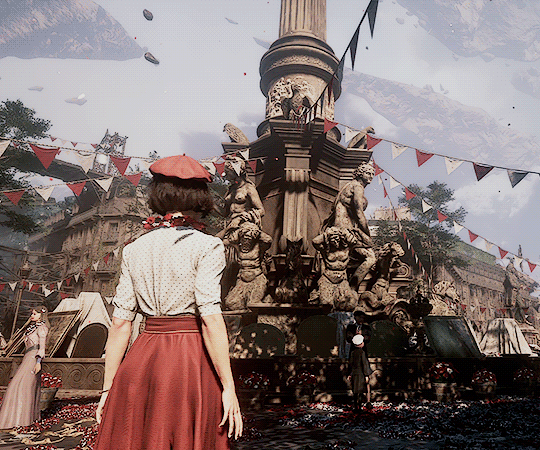
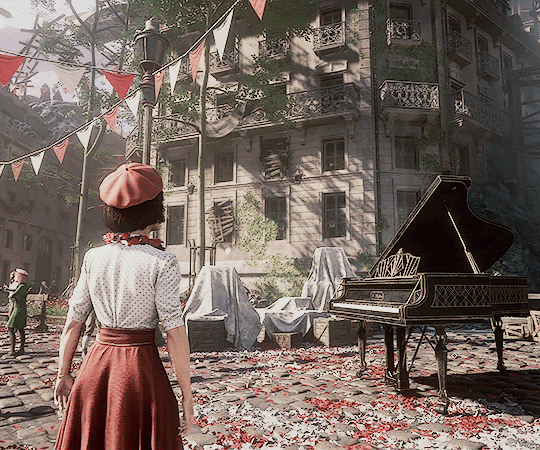

LUMIÈRE Clair Obscur: Expedition 33 (2025), dev. Sandfall Interactive
#clair obscur: expedition 33#gamingedit#gamingscenery#dailygaming#sophie#exp33edit#edit:all#edit:gif#how can a game be so beautiful ugahgahh 😭#teared up before i even finished the prologue lmao 😭#only 2 hrs in but im literally like... art 10/10 music 10/10 combat 10/10 narrative 10/10 😭 lol#(lowkey have a feeling the story will have a twist like nier automata's? 🙈 im excited...)#don't want to make presentation slides let me play aaaah!!!
391 notes
·
View notes
Text


#hal jordan#sinestro#green lantern#make a fancomic without inserting narratively irrelevant headcannons [IMPOSSIBLE]#make a fancomic set in the 70s between the silver twist and the solo series [CHALLENGING]#just draw the ending it's your favorite part! [EASY]
198 notes
·
View notes
Text


[ID: a digital drawing in two parts, depicting characters from pokemon horizons, facing with their back to the viewer: the first drawing depicts the three original explorers heading away towards the light, as lucius hugs rystal and gibeon's shoulders. the second drawing depicts liko and amethio, their descendants, standing still and facing the light. end ID.]
"our adventure isn't over yet, isn't that right?"
#vi draws#IM SO.... INCONSOLABLE ABOUT THIS PLOT.....#so i had to draw something.... genuinely this narrative and story mean so much to me that im still sort of in disbelief#that pokemon is delivering such a beautifully poignant study of legacy... and time... and grief... and bloodlines and how fate#twists and turns around them.#the original explorers... they all loved each other so dearly. and now they pass the baton to their descendants.... the frieren of it all.#but genuinely. beautiful writing all around tying together my two favorite characters by thematic threads. argh.#basically im full of emotions about this story... hopefully i managed to convey them here#pokemon#anipoke#pokemon horizons#pokemon horizons fanart#amethio#liko#pokemon gibeon#pokemon lucius#pokemon rystal#tagging is so scary as usual
253 notes
·
View notes
Text
Why is the West Obsessed with the Skin Color of Ancient Greeks?


It’s 2025, yet somehow, debates about the skin color of the ancient Greeks remain alive and... well, frustrating. As a Greek myself, I find it baffling how modern misconceptions about my country's history have reached a point where even our identity is distorted for the sake of Western narratives.
First, geography and genetics.
Greece is situated in Southern Europe, with a Mediterranean climate and population. According to legit records ,like anthropological studies, the majority of Greeks (ancient and modern) have been light-skinned with olive undertones, a trait shared across Mediterranean populations. Sure, there was some variation, ancient art shows people with different tones, reflecting interactions with neighboring regions. But the idea that all Greeks were black? It’s simply not supported by evidence.
Here’s some geography-backed context:
Greece is part of the Mediterranean, not sub-Saharan Africa.
Genetics studies (like those from the European Journal of Human Genetics) have shown that Greeks today have maintained strong continuity with their ancestors.
And because of the West's global influence, these misconceptions have spread to other countries. People from entirely different regions now parrot these false narratives, thinking they are historically accurate. Suddenly, Greeks find themselves having to defend their heritage against a world that’s been misinformed by media and pop culture. It’s not just frustrating—it’s harmful. It reduces our history to a battleground for other people’s identity politics while sidelining the true richness of Greek and African cultures alike.
This constant distortion has a negative impact on modern Greeks. Many of us are left defending our identity against a barrage of false claims. It also shifts focus away from celebrating the real diversity of history. why not care about actual African mythology, like the rich lore of the Yoruba pantheons? Why insist on fitting everything into a Western-centric mold, ignoring authenticity?
It’s exhausting to see this obsession continue in recent times. Representation matters, yes, but it should never come at the cost of erasing someone else’s history
#misinformation online is harmful#please do better#there's no harm in respecting actual historical facts about a county#it's harmful twisting the narrative to fit agendas#greek history#greek mythology#greek representation#greek retelling#my post#Hollywood#booktok
463 notes
·
View notes
Text
Rhaegar Targaryen is easily one of GRRM’s best deconstructions of the genre and we don’t talk about it enough. He’s prince living in a world full of magic and wonder that has dwindled over time. His own family had a great monopoly on one of the most magical phenomena (dragons) to ever exist, but they lost this control over time and it was due to their own faults. But there’s an all encompassing hope that this magic, these dragons, will come back. They all live within the promise that it will all be back and with a huge bang. It’s all so romantic. Magical forces of ice and fire battling it out in a song.
Then there’s Rhaegar, a prince born for the sole purpose of being this song’s romantic hero. He already has his destiny mapped out and it will be a great one, greater than any other man who ever lived. It’s a song of ice and fire, and Rhaegar is its bard. You’d expect this to give him joy. Yet by all accounts, he was depressed as fuck. I think he’s unfairly earned the reputation of having an ego so big to think that he will be the hero….but that’s quite literally the point of his existence. He was born to be the hero. He paid the price at birth to be the hero. How can he revel and glory in this destiny when he has no say in it?
So it’s genuinely funny that when given the chance, Rhaegar immediately pivots to someone else taking on this burden. But how tragic for him that he cannot escape it too far. Because it will be none other than his own son who, under a “bleeding star”, is marked at conception for this great destiny without a say. More than his ego, Rhaegar is marked by the inability to escape this duty. His whole life is dedicated to fulfilling a duty he can never escape. He isn’t just a future king, prophecy dictates that the world’s survival is placed squarely on his shoulders. Even when he isn’t the hero, he’s now responsible for raising him…
…but then he makes one decision and it all comes crumbling like a pack of biscuits. He escapes this burden…but dies. And his successor dies too. And now the ones who will inherit his legacy are two people who never knew him. They never knew of his burdens, of this prophecy. But they too cannot escape its jaws. I think this does bring up some interesting questions about the nature of fate and destiny in the world of ice and fire. Can you really escape it? Rhaegar tried to, and paid the price for his defiance, but he never truly made it out because the burden instead jumped to the son (and sister) he never knew. Funny thing is that in a bizarre (and tragic, in its own way) twist of fate, this son was brought up entirely without the trappings of power that depressed Rhaegar. Rhaegar was a dazzling prince, Jon is a bastard. Rhaegar was marked by his great inheritance, Jon is marked by the lack thereof. Does fate say “well the first one got too depressed by having too much so let’s give the next one nothing?” Even Dany, who grows up a princess does not have the privileges that Rhaegar did. So how does upbringing craft a hero and the choices they make? Welll, GRRM had given us two versions of Rhaegar’s tragedy in Jon and Dany for us to see.
Rhaegar’s impact on the meta-narrative is honestly so massive. Like I’d put him right up there with Quentyn, Sansa, and Bran as one of the best genre deconstructions in the series and no one can tell me otherwise.
#rhaegar you are a hot mess express BUT THEY COULD NEVER MAKE ME HATE YOU!!!#this is why i dont think rhaegar approached lyanna specifically for prophecy - however twisted i genuinely think he did it for love#it just works better from a narrative standpoint if he chose love for the first time in his life and this love allowed him to escape duty#but then he paid the ultimate price for it because he just can’t walk away#only death can pay for life and all that#in my rhaegar posting hours#brb gonna sob uncontrollably#asoiaf#valyrianscrolls#rhaegar targaryen#jon snow#daenerys targaryen
627 notes
·
View notes
Text

corpius ss redraw
#razables#metroid#metroid dread#samus aran#corpius#guess who’s finally replaying dread and actually understanding the narrative bc they’ve played fusion😭😭#THIS GUY!!!#anyways samus makes me go crazy insane in this game she is hot shit and she OWNS IT#i could gush for hours about this game honestly..the animation the gameplay the art style / direction THE PLOT TWIST(S)#IUGH. SHES SO GOOD EVERYONE SAY THANK YOU METROID DREAD WE LOVE YOU METROID DREAD
153 notes
·
View notes
Note
you don't still have that doodle of Maleanor in a low cut dress, do you? asking for reasons 👀 👀 👀 👀 👀 👀
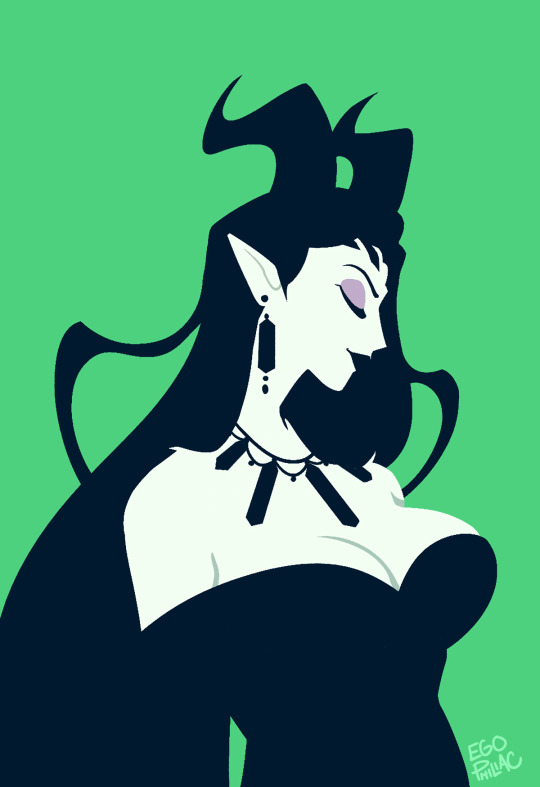
endless 👏 Meleanor 👏 forever 👏
#art#twisted wonderland#always be posting dragon princess#probably shoulda just stuck with this one since it turned out waaaaay better than the actual thing. oh well#granted i speak from a place of extreme meleanor bias#i will draw her ten times as important as she was in canon#and also ten times thirstier#doomed by the narrative bazoomed by the fanart
3K notes
·
View notes
Text
The Riftwar Saga: Crafting Epic Fantasy Worlds
In the well-trodden landscape of fantasy literature, Raymond Feist‘s “Riftwar” series is akin to a magical tempest – it came, it saw, and it decidedly left its mark. This wasn’t just another saga of swords and sorcery; this was an epic that tore through the fabric of the genre and stitched it back together with a twist. With its blend of traditional fantasy and bold narrative innovations,…
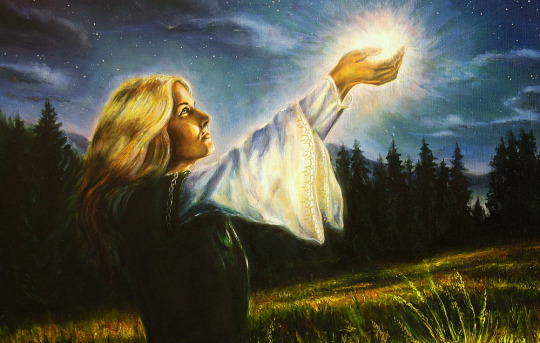
View On WordPress
#Character Arcs#character development#complex plotting#epic fantasy#fantasy literature#Fantasy Sagas#fantasy writing#genre influence#high-concept fantasy#magic systems#multi-dimensional characters#narrative innovation#narrative twists#portal fantasy#Raymond Feist#Riftwar series#traditional fantasy#world collision#world-building
1 note
·
View note
Text
Palestinian freedom fighters breaking out of Gaza and reclaiming their occupied territories. They’ve taken over israeli tanks and have chased out the settlers that were on that land. They’ve launched rockets everywhere and the iron dome has failed to intercept. This is about to mark a momentous event in history.
From the river to the sea, Palestine will be free.
#free palestine#it feels so surreal and so shocking#there’s so much hope but so much fear#you just know they’re about to retaliate with the genocide they’ve been planning for years now#i fear for my palestinian brothers and sisters but this is so fucking huge#they tore down part of the barbed wire fence!!!! the people of Gaza are breaking out!!!!#god there’s so much more on twitter but i beg if you look do NOT look at non-palestinian sources#they’re twisting the narrative as if this isn’t retaliation for 76 years of torture#as if the israeli forces and settlers didn’t kill 4 palestinians yesterday alone#as if they haven’t killed nearly 300 palestinians this year alone#do NOT let the media trick you into thinking anything after will be a retaliation to an attack Palestine started#PALESTINE is the one retaliating#also if you’re gonna come in here with both sides or whatever sincerely block me and lmk so i can blokc you#they’ve already out out statements to leave children and the elderly alone so any middle aged fuckers are free to kill :)#which is fine since they’ve likely killed hundreds if not thousands of their friends and family and neighbors anyway#tag: important#fuck israel#gaza#tag: october 7 2023
2K notes
·
View notes
Text
i actually got so much more attached to the concept of varric "centrism dwarf" tethras after i decided that his trash novels were going to be the harbinger of unexpected changes in thedas fhdsgfjhd.
woe! print mass media be upon ye! the chantry HATES him! kirkwall man discovers this weird new trick to reduce the hold of tranquil-run chantry scriptoriums, by getting all of southern thedas hooked on his secular serialized fiction, thus spurring every major city to buy printing presses-
#txt#varric tethras#and he even used his malevolent lures (bad romance novels) to get the right hand of the divine into it!!#his machinations are so advanced...!!#<- presumably this is what the chantry higher ups think is going on#while varric is peacefully like ''wow. i love getting royalties from my publisher. i think the next plot twist is a secret evil twin :)''#''haha it's so funny that the seeker is into my worst and trashiest novels :)''#''it's great being an apolitical writer who's just making entertainment for all :)''#(i do like varric even otherwise but this is VERY funny to me fhsdhjfd)#he tried to escape the narrative by writing about it instead but unfortunately it was Inescapable#and his pulp fiction was TOO compelling to the masses
134 notes
·
View notes
Text
There’s something very strange about Paul’s usual “how John and I started writing” narrative. Here’s how he likes to describe it:
Me and John knowing each other, the fact that both of us independently had already started to write little songs... I said to him, “What’s your hobby?” I said, “I like songwriting,” and he said, “Oh, so do I.” You know, no one I’d ever met had ever said that as a reply. And we said, “Well, why don’t you play me yours and I’ll play you mine.” GQ, 2020
It’s my impression that this is now in the rotation of Paul Stories - I think he says it in McCartney 3,2,1, and in other interviews. Is it true? The earliest accounts contradict it:
“Paul’s first public performance, as a member of the Quarrymen, was at a dance… later on, after the dance, he played a couple of tunes to John he had written himself. Since he’d started playing the guitar, he had tried to make up a few of his own little tunes. The first tune he played to John that evening was called ‘I Lost My Little Girl’. Not to be outdone, John immediately started making up his own tunes.”
Hunter Davies, The Beatles, 1968
“‘I learned a lot from Paul. He taught me quite a lot of guitar really. He knew more about how to play than I did and he showed me a lot of chords. I’d been playing the guitar like a banjo so I had to learn it again. I didn’t write much material early on, less than Paul, because he was quite competent on guitar. I started to write after Paul did a song he’d written.’”
John Lennon to Ray Connolly, unpublished interview, 1970*
"He used to write songs before I even started writing songs."
John Lennon, St Regis interview, 1971
*[The Connolly quote is weaker as a source, because was published after John’s death (and he quotes it slightly differently: “I started to write after Paul did a song he’d written” is in Connolly’s John biography, but not in the version in his collected Beatle journalism). But it fits with the other accounts.]
Still, Paul’s version might have some truth in it. Mark Lewisohn cites a couple of 1971 interviews where John remembers trying to write a calypso song, tapping into a brief craze of spring 1957. I don’t know if he finished it, or told anyone about it. None of the Quarrymen mention it, while Pete Shotton told Bob Spitz that John was “floored” when Paul first played him one of his own songs. But the calypso story does make “so do I” seem more possible.
It’s still surprising that Paul wants to frame it this way. He’d be justified in pointing out that songwriting was his innovation, something he brought to the band. By any measure, he’s the one who started it: when he met John, he’d already written the melody of When I'm 64, plus Suicide and I Lost My Little Girl. And he was always prolific. As John told David Sheff, talking about I’ll Follow The Sun, “he had a lot of stuff”, “written almost before the Beatles, I think.” He was the one pushing to do their own material, whether that’s talking it up to music promoters or suggesting In Spite of All The Danger at their first amateur recording session. (To me, that suggests that Lennon-McCartney was established later than they tended to admit. In Spite of All The Danger, recorded in 1958, has George as cowriter; if Paul had written anything with John, I bet that's what he'd have suggested they record. And if John on his own had written something that was ready to record, they’d definitely have picked that. )
In the 1950s, writing your own material was groundbreaking: it’s part of the huge cultural shift into the 1960s. There were hundreds of skiffle/rock’n’roll bands in Liverpool, but it’s genuinely possible that Paul was the only songwriter among them. Why isn’t that the story he wants to tell?
When Paul started defending his legacy in the late 1980s, he was fighting against specific distortions. First, that he was the middle-of-the-road conservative one - which is why he lays out his avant garde credentials. So you’d think he’d want to remind everybody that he wrote songs first. But second, he’s up against the idea that he and John didn’t love each other, that they didn’t write together, that Lennon-McCartney was a myth. Paul is a rock star, with an ego to match; he’s not given to downplaying himself. But he wants the partnership more than he wants precedence, even more than he wants credit for innovation.
And he always did. Remember the story about John sharing half his chocolate bar? Paul joined the band, and shared half his songs.
He didn’t need to: he was already writing alone. If he wanted help, George was more musically accomplished, and would have been a more logical choice for a songwriting partner. But it's John whose attention and praise Paul needed, John who had the authority to say they’d play Paul’s songs, John who needed to feel like the most important person in the band. Becoming Lennon-McCartney formalises all of that. And Paul is still true to it.
Across decades, Paul has been consistent about promoting their partnership as a partnership, regardless of who did what. (This isn’t true of John, who by the late 1960s was eager to break down who wrote which song, which lyric, which middle eight.) After working with George Martin on the string arrangement for Yesterday, Paul signed the score: “"Yesterday" by Paul McCartney John Lennon George Martin Esq and Mozart.” Even as a joke, you don’t separate Lennon and McCartney. Ken Mansfield asked Paul why songs were “Lennon-McCartney” when John hadn’t been there for the writing process:
And Paul said: “John and I are so close to each other, we’ve been through so much together, we understand each other so much, our relationship is so deep, that when we’re songwriting,” he said, “even if I’m 6,000 miles away, I can be working on something and I can hear John over my shoulder going, ‘No, no, no, that’s not gonna work; why don’t we do this?’ Or ‘Hey, I like this.’” He said, “So, in essence, to me, we’re songwriting together even if we’re not together.”
Ken was asking about Ob-La-Di Ob-La-Da, not realising that John was there for that one: they worked on it in India. But rather than giving a practical answer, Paul chooses to frame the partnership as a profound connection. (Of course there are other times Paul insists on or overstates his contribution, or gets petty about who did what. He’s human, and he’s an egomaniac. But always, always within the framework that this was a partnership.)
Fundamentally, he’s loyal to Lennon-McCartney. “So do I” matters more to him than going first. It might not be literally true, but it's the emotional truth that he needs.
#once you’ve noticed that paul started the songwriting you can’t unsee it#reading beatle books you can see who hasn’t noticed#and who definitely has and is trying to distract you from it#i mean imagine if john had been the one to write first#jann Wenner and philip norman and mark lewisohn would never shut up about it#in the long run of course it’s more important that one band had paul AND john AND george writing songs#but if you’re telling the origin story it does matter how they grew up and who did what#it puts a different slant on the songwriting credits#and the timing of that argument#by the time they met brian john was powering up as a songwriter#he was now an equal partner and he wanted first place#it underlines what a twist of the knife it was for john to call lennon-mccartney a myth and claim they never wrote together#but also why late 1960s john was so desperate for reassurance that he’d written this or contributed that#john at his cruellest is always john at his most insecure#songwriting#narratives#tag for mine or my addition#john and paul#paul mccartney
161 notes
·
View notes
Text
Rookugoka!
[L -> R]
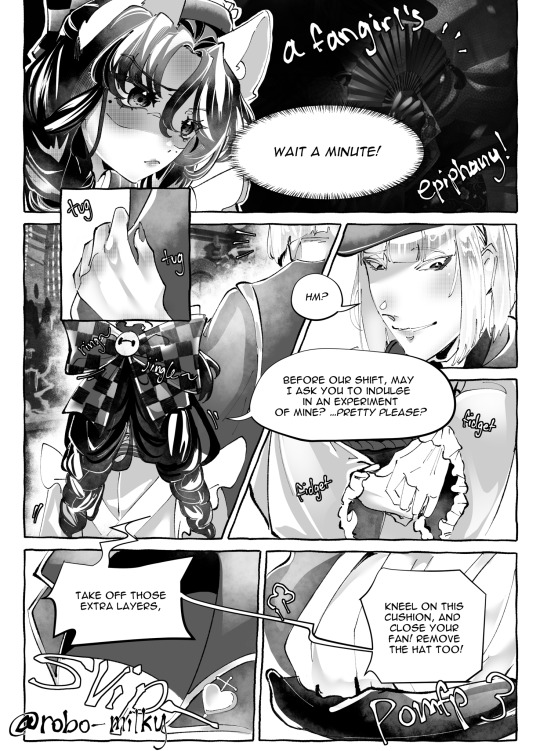

Rakugo (落語, literally 'story with a fall')[1] is a form of Japanese verbal comedy, traditionally performed in yose theatres.[2] The lone storyteller (落語家, rakugoka) sits on a raised platform, a kōza (高座). Using only a paper fan (扇子, sensu) and a small cloth (手拭, tenugui) as props, and without standing up from the seiza sitting position, the rakugo artist depicts a long and complicated comical (or sometimes sentimental) story.
[Comments]
Just like our lovely Cloche here, pLEASE READ “AKANE-BANASHI” !! This manga about Rakugo is what inspired this short and I am BRAINROTTING WITH A RAKUGOKA AU- (unfortunately with Rollo cause it’s so different from his usual personality)
This year, I AM HERE TO RECLAIM MY TITLE AS ROOK’S TROPHY WIFE— …or not ahaha- Rook is still my type but Rollo’s taken more of mind lately 😔 Anyways— back to my doujin era for y’all!
#I’ve drawn some NY Rook last year so I wanted to take a narrative approach with this#it occurred to me that I’ve NEVER touched upon how Rook and Cloche would interact with similar interests 😭#it would be like Rook and Idia except if Idia was more receptive#cat scribblez 🌸#glimpses 🌸#oc: cloche🎊#rookloche#twisted wonderland#twst#twst oc#rook hunt#twst rook#twst new years#twst new years attire#twst fanart#twst art#twisted wonderland fanart#twisted wonderland art#ツイステ#ツイステッドワンダーランド#ルーク・ハント#rook x yuu#rook hunt x yuu#rook x oc#rook hunt x oc#twst ocs#twst yuu#twst yume#twst yuusona#yuusona
214 notes
·
View notes